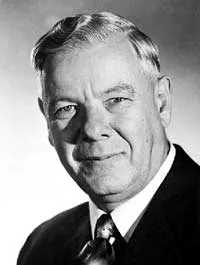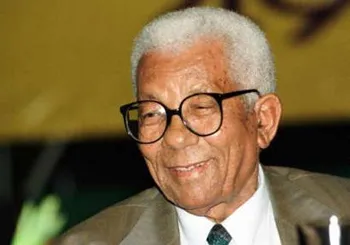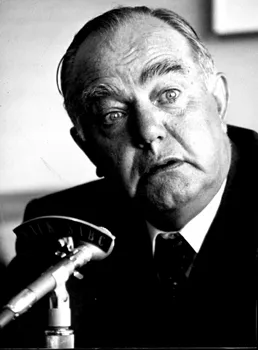![]()
Appendix 1: Key Players
Hendrik Frensch Verwoerd 1901–1966
H. F. Verwoerd is remembered as the architect of the racist laws and segregation practice known as ‘grand apartheid’. Verwoerd was born in Amsterdam, Holland. His father was a shopkeeper and a deeply religious man. The family moved to South Africa in 1903 and settled for ten years before moving to Rhodesia. Here, Verwoerd senior became an assistant evangelist in the Dutch Reformed Church. After four years they returned to South Africa.
H. F. Verwoerd
The young Verwoerd excelled at school and went on to obtain a doctorate in philosophy at the University of Stellenbosch. He continued his studies in psychology in Germany after which he returned home in 1927 to lecture at his old university. He was appointed Professor of Sociology and Social Work. In 1937 he became editor of ‘Die Transvaler’, an Afrikaans newspaper supporting the National Party (NP). He was strongly in favour of racial segregation and attacked the ruling United Party’s policy of ‘pampering, levelling and living together’. In 1938 he published a poster condemning mixed marriages. During the Second World War ‘Die Transvaler’ adopted a pro-Nazi position.
In 1948 when the National Party led by D. F. Malan came into power, Verwoerd left his position as editor to represent the National Party in the Senate. In 1950 he was appointed Minister of Native Affairs and was responsible for the displacement of some 80,000 black Africans. As part of his portfolio, he was in charge of African education where his policy limited any form of higher education for those he regarded as ‘hewers of wood and drawers of water’.
Verwoerd became Prime Minister in 1958 on the death of his predecessor J. G. Strijdom. He reformulated apartheid, claiming that black people were not ineligible to vote because they were inferior, but because they owed their loyalty to tribal affiliations and would be given equal political rights in their own ‘homelands’. In April 1960 Verwoerd escaped assassination when he was shot twice in the face. Six years later, in 1966 a second attempt on his life proved fatal.
Verwoerd’s apartheid homeland policy was a major obstacle on the road to equality in South Africa, the ripple effects of which are still felt today.
Walter Max Ulyate Sisulu 1912–2003
Walter Sisulu was born in Eastern Cape. He was the son of a white father and a Xhosa mother named Alice Mase Sisulu. His father played no role in his upbringing and he was raised by his mother’s family who were related to Nelson Mandela’s first wife. Sisulu attended a local missionary school after which he moved to Johannesburg in 1928 and worked in various manual jobs.
Walter Sisulu
Walter Sisulu joined the African National Congress (ANC) in 1940 together with Oliver Tambo and Nelson Mandela; he joined its Youth League in 1943. In 1944 Sisulu married Albertina Thethiwe. Nelson Mandela was best man at the wedding.
Sisulu was made Secretary General of the ANC in 1949, and played a key role in the formation and planning of the activities of the armed wing of the ANC, known as the Umkhonto we Sizwe (MK). Sisulu was also a member of the South African Communist Party. He was arrested in 1952 for planning a campaign of defiance and given a suspended sentence. He travelled to Europe, the Soviet Union, Israel, and China as an ANC representative. He was jailed seven times over the next ten years, including a five-month stretch in 1960, and was also held under house arrest.
In 1962 he was sentenced to six years in prison but was released on bail pending his appeal. He went underground in 1963, resulting in his wife, Albertina, being the first women to be arrested under the so-called ‘90-day Law’. He was captured at Rivonia along with sixteen others. In 1964, Sisulu was one of 155 men tried for treason and sentenced to life imprisonment. With Mandela and other senior ANC figures, he served the majority of his sentence on Robben Island.
In 1989 he was released after serving twenty-six years in prison. After the ANC was unbanned, Sisulu was elected its deputy president and remained in the position until after South Africa’s first democratic election in 1994. In 1992, he received the Isitwalandwe Seaparankoe, the highest honour awarded by the ANC for his service to the liberation struggle. Walter Sisulu died in May 2003. He was survived by his wife Albertina (affectionately called Ma-Sisulu) who died on 2 June 2011.
Balthazar Johannes Vorster 1915–1983
B. J. Vorster was born and attended school in Uitenhage in the Cape Province. He was the fifteenth son of a sheep rancher. He studied law at Stellenbosch University and graduated in 1938. He became registrar to the Judge President of the Cape Division of the Supreme Court and shortly thereafter entered practice as an attorney in Port Elizabeth, and subsequently in Brakpan.
The Second World War saw Vorster become active in the Ossewabrandwag, a movement that was responsible for various acts of sabotage designed to hinder South Africa’s aid to the Allied Forces. Vorster rose to the rank of general. In September 1942 he was interned in a detention camp until February 1944, when he was released under restrictions. The experience of internment served to increase his anti-British attitude.
B. J. Vorster
Vorster’s first attempt to run for parliament in 1948 failed by a narrow margin, but in 1953 he won the constituency of the small town of Nigel for the National Party and took his seat in parliament. He became known for his prowess in debate and rose to deputy minister. In 1961 he became a full minister, responsible for justice, social welfare, and pensions. Following the Sharpeville riots of the previous year and faced with further underground activities of extra-parliamentary opposition, Vorster developed a formidable security police force supported by harsh legislation, giving wide powers to the police such as detention without trial. His activities as minister of justice bestowed a ‘strong-man’ image on Vorster and after the assassination of Verwoerd in September 1966, Vorster was unanimously elected leader of the National Party and became prime minister.
As Prime Minister, Vorster tried to project a conciliatory image, endeavouring to mollify English-speaking whites. His attempts to befriend African States had little effect other than to anger the right-wing of his own National Party, which broke away in 1970 to form the Hestigte (Reconstituted) National Party (HNP). In a snap election called shortly after the split, the HNP was thoroughly beaten at the polls. Vorster remained a strong proponent of apartheid under its sanitized name of ‘separate development’.
Vorster retired as Prime Minister in 1978 and was given the honorary ceremonial position of President. An investigation into the establishment of an English language newspaper by the government during Vorster’s tenure as Prime Minister concluded that he was implicated in the use of a government slush fund for the purpose. Vorster resigned in disgrace and died in 1983.
Pieter Willem Botha 1916–2006
P. W. Botha’s father had fought against the British in the Second Anglo-Boer War and his mother had been interned in a British concentration camp. Botha attended school and university in the Orange Free State where he read law, dropping out before graduation to pursue a political career.
In 1939, South Africa entered the Second World War. Anti-British factions coalesced to form the Herenigde (Re-united) National Party which became the National Party (NP). In that year Botha became the leader of the Cape Town branch of the pro-Nazi Ossewabrandwag but was expelled for accusing the newspaper Die Burger of interference in national politics. The expulsion was fortunate for Botha who thereby avoided internment.
Botha helped the National Party win the general election of 1948 and he gained a parliamentary seat. With Verwoerd elected Prime Minister in 1958, Botha was appointed Deputy Minister and in 1961, the Minister of Community Development and Coloured Affairs. He was responsible for the forced removal of coloured people under the Group Areas Act. In 1966 Botha was made Minister of Defence, a post he held for fourteen years.
During the Cold War, President Gerald Ford sought to forestall the growth of Communism in Africa by inviting South Africa to assist in installing a pro-West government in Angola. In 1975 as Minister of Defence, Botha sanctioned ‘Operation Savannah’ in which South African troops invaded Angola. The Angolan civil war intensified, with Russians, Cubans, East Germans, South Africans, and Americans acting as ‘military advisors’ in the country. In December 1975, the US abruptly terminated its support and South Africa was left to withdraw its troops. The People’s Liberation Movement, Movimento Popular de Libertação de Angola (MPLA), moved troops to the border with South West Africa, where they assisted the South West African People’s Organisation (SWAPO) in a guerrilla war against South Africa.
When Vorster retired in 1978, Botha became Prime Minister and retained the Ministry of Defence which included control of National Intelligence. Botha announced apartheid dead and urged Afrikaners to ‘adapt or die’. Internally he engaged in constitutional juggling, continuing the policy of apartheid while appearing to implement reform. Defence capability was enhanced and the arms manufacturing industry was enlarged. Externally he implemented a policy of destabilization of the country’s neighbours, including cross-border raids supposedly in the pursuit of guerrillas.
In 1984 the constitution was modified and Botha became executive State President. A year later when commentators expected him to announce positive reforms including the release of Mandela, Botha delivered a defiant speech warning the world ‘not to push him too far’ stating he would not take ‘white South Africans and other minority groups on a road to abdication and suicide.’ Botha did repeal laws around ‘petty’ apartheid, such as the prohibition of mixed marriages, pass books, and segregation amenities. He created a tri-cameral parliament, giving Coloureds and Indians separate houses of representation. The Group Areas act and ‘homelands’ policy remained. The South African economy faltered under international sanctions as global condemnation of apartheid reached a crescendo.
In January 1989, Botha had a mild stroke. He resigned as leader of the National Party but refused to give up the presidency. F. W. de Klerk took over party leadership, and at a National Party caucus meeting Botha was asked to resign. De Klerk became acting state president the following day.
Botha refused to testify to the Truth and Reconciliation Commission (TRC) in 1998 preferring to take the knowledge of the atrocities committed during his tenure to his grave. In 2006 he died at the age of ninety ‘...



